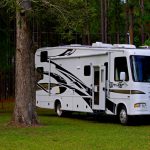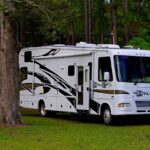
Navigating the world of full-time RV state taxes can feel like a complex maze, but fear not! Whether you’re a seasoned road warrior or just starting your RV journey, understanding the tax implications of living on the road is crucial for your financial well-being. Did you know that choosing the right state for your domicile can save you thousands in taxes? In this article, we’ll break down the essential tips and tricks you need to know, including the best states for tax benefits, how to establish residency, and common pitfalls to avoid.
Imagine cruising through stunning landscapes while knowing you’re maximizing your tax savings. From deductions you might not even be aware of to real-life stories from fellow RVers, we’ve got you covered. So, buckle up as we dive into the nitty-gritty of full-time RV state taxes!
Key Takeaways
- Choose Your Domicile Wisely: States like Florida and Texas offer significant tax advantages with no state income tax.
- Keep Accurate Records: Documenting your travels and expenses is crucial for tax compliance and maximizing deductions.
- Explore Available Deductions: From RV loan interest to home office expenses, there are numerous deductions that can lighten your tax load.
- Consult a Tax Professional: When in doubt, seek expert advice to navigate the complexities of state taxes.
- Stay Informed: Tax laws change frequently; staying updated can save you from unexpected liabilities.
Ready to gear up for your RV adventures? 👉 Shop RV Accessories on: Amazon | Camping World | Walmart.
Table of Contents
Quick Tips and Facts
Understanding Full-Time RV State Taxes: What You Need to Know
The Best States for Full-Time RV Living and Tax Benefits
How to Establish Residency While RVing Full-Time
Tax Implications of Full-Time RV Living: Deductions and Credits
State-Specific Tax Considerations for Full-Time RVers
Common Mistakes Full-Time RVers Make with Taxes
Tips for Keeping Track of Your RV Expenses
How to File Taxes as a Full-Time RVer
The Importance of Keeping Accurate Records
Consulting a Tax Professional: When and Why
Real-Life Stories from Full-Time RVers on Taxes
Related Stories: RVing and Taxes
Conclusion
Recommended Links
FAQ
Reference Links
Quick Tips and Facts
-
Know Your Domicile: Establishing your legal residency in a tax-friendly state can save you a bundle! States like Florida, Texas, and South Dakota are popular choices for full-time RVers. 🏞️
-
Track Your Time: Keep a detailed log of where you spend your time. This can help clarify your residency status and tax obligations. 📅
-
Deductions Galore: Don’t forget to explore deductions for RV loan interest, home office expenses, and even solar panel installations! 💰
-
Consult a Pro: Tax laws can be tricky. Consulting a tax professional who understands the nuances of full-time RV living can save you headaches down the road. 🧑💼
-
Stay Updated: Tax laws change, so keep yourself informed about any new regulations that may affect you as a full-time RVer. 📖
Understanding Full-Time RV State Taxes: What You Need to Know
When you hit the road full-time in your RV, understanding state taxes is crucial. State taxes can vary widely, and knowing how they apply to you can save you money and stress. Here’s what you need to know:
The Basics of State Taxes for RVers
-
Domicile vs. Residency: Your domicile is your permanent home, while residency can be temporary. Many full-time RVers choose to establish domicile in a state with no income tax.
-
Tax Obligations: If you work remotely, your tax obligations may depend on where your employer is based and where you physically work. For instance, if you’re working for a California company while living in Florida, you might still owe California taxes.
Key Considerations
-
Physical Presence: States often require you to be physically present for a certain number of days to establish residency. For example, Florida requires you to be there for at least six months and one day to be considered a resident.
-
Mail Forwarding Services: Many RVers use mail forwarding services to maintain a permanent address in their chosen domicile state. This can be a game-changer for managing your taxes and official documents.
The Best States for Full-Time RV Living and Tax Benefits
Choosing the right state for full-time RV living can significantly impact your tax situation. Here’s a breakdown of some of the best states for tax benefits:
| State | Income Tax | Sales Tax | Property Tax | Benefits |
|---|---|---|---|---|
| Florida | 0% | 6% | Varies | No state income tax, great weather 🌞 |
| Texas | 0% | 6.25% | Varies | No state income tax, RV-friendly laws 🚐 |
| South Dakota | 0% | 4.5% | Varies | No state income tax, easy registration process 🏞️ |
| Wyoming | 0% | 4% | Varies | No state income tax, low property taxes 🏔️ |
Why These States?
-
No State Income Tax: States like Florida, Texas, and South Dakota offer significant tax advantages by not taxing your income. This can be a huge benefit for full-time RVers who may have fluctuating incomes.
-
Friendly Regulations: These states have laws that are more accommodating to RVers, making it easier to register your vehicle and establish residency.
How to Establish Residency While RVing Full-Time
Establishing residency while living full-time in an RV is essential for tax purposes. Here’s a step-by-step guide:
-
Choose Your State: Research and select a state that offers tax benefits and aligns with your lifestyle. Consider factors like climate, amenities, and RV parks.
-
Get a Permanent Address: Use a mail forwarding service to establish a permanent address in your chosen state. This will be your official domicile.
-
Register Your Vehicle: Register your RV in your new state. This often requires proof of residency, so keep all relevant documents handy.
-
Update Your Driver’s License: Change your driver’s license to reflect your new address. This is crucial for establishing your domicile.
-
File Taxes Accordingly: Once you’ve established residency, file your taxes in your new state. Don’t forget to take advantage of any deductions available to you!
Tax Implications of Full-Time RV Living: Deductions and Credits
Living full-time in an RV can open up a world of tax deductions and credits. Here are some key ones to consider:
Common Deductions
-
RV Loan Interest: Just like a mortgage, you can deduct the interest on your RV loan. This can be a significant savings! IRS Publication 936
-
Home Office Expenses: If you work from your RV, you may qualify for home office deductions. This includes a portion of your RV expenses, such as utilities and repairs. IRS Form 8829
-
Solar Energy Credits: If you’ve installed solar panels on your RV, you can claim a federal tax credit of 30% of the installation costs. IRS Form 5695
Tax Credits to Consider
- Health Savings Account (HSA): If you have a high-deductible health plan, contributions to an HSA are tax-deductible. This can help reduce your taxable income while saving for medical expenses. IRS Form 8889
State-Specific Tax Considerations for Full-Time RVers
Each state has its own tax laws that can affect full-time RVers. Here’s a quick look at some state-specific considerations:
-
California: If you work for a California-based company, you may still owe state taxes even if you live elsewhere. Keep track of your time spent in California to avoid surprises.
-
Florida: Known for its tax-friendly policies, Florida has no state income tax, making it a popular choice for RVers. However, ensure you meet residency requirements.
-
South Dakota: This state is a favorite for RVers due to its lack of income tax and straightforward vehicle registration process.
Common Mistakes Full-Time RVers Make with Taxes
Navigating taxes as a full-time RVer can be tricky. Here are some common pitfalls to avoid:
-
Not Keeping Accurate Records: Failing to track your time spent in different states can lead to tax complications. Use apps or spreadsheets to log your travels. 📊
-
Ignoring State Laws: Each state has different tax laws. Make sure you understand the regulations in your domicile state and any states where you spend significant time.
-
Overlooking Deductions: Many RVers miss out on valuable deductions. Consult a tax professional to ensure you’re taking advantage of all available credits.
Tips for Keeping Track of Your RV Expenses
Keeping track of your RV expenses is crucial for tax purposes. Here are some tips to simplify the process:
-
Use Expense Tracking Apps: Apps like Expensify or Mint can help you log expenses on the go. 📱
-
Organize Receipts: Keep all receipts in a dedicated folder or use a digital solution like Evernote to store them electronically.
-
Monthly Reviews: Set aside time each month to review your expenses and categorize them. This will make tax time much easier!
How to File Taxes as a Full-Time RVer
Filing taxes as a full-time RVer doesn’t have to be daunting. Here’s a step-by-step guide:
-
Gather Your Documents: Collect all necessary documents, including W-2s, 1099s, and receipts for deductions.
-
Choose Your Filing Method: Decide whether to file online using software like TurboTax or consult a tax professional.
-
Complete Your Tax Return: Follow the prompts to enter your income and deductions. Don’t forget to check for state-specific requirements.
-
File on Time: Ensure you file your taxes by the deadline to avoid penalties. Set reminders to keep yourself on track!
The Importance of Keeping Accurate Records
Accurate record-keeping is essential for full-time RVers. Here’s why:
-
Tax Compliance: Maintaining detailed records helps ensure you comply with tax laws and can substantiate your claims if audited.
-
Financial Management: Keeping track of your expenses allows you to manage your budget effectively and identify areas for improvement.
-
Peace of Mind: Knowing you have organized records can alleviate stress during tax season. You’ll be prepared for anything!
Consulting a Tax Professional: When and Why
While many RVers choose to file their taxes independently, consulting a tax professional can be beneficial. Here’s when to consider it:
-
Complex Situations: If you have multiple income sources or travel extensively, a tax pro can help navigate the complexities.
-
Changing Laws: Tax laws can change frequently. A professional can keep you updated on any changes that may affect you.
-
Maximizing Deductions: A tax expert can help identify deductions you may have overlooked, potentially saving you money.
Real-Life Stories from Full-Time RVers on Taxes
Hearing from fellow RVers can provide valuable insights. Here are a couple of stories:
-
Lela’s Journey: Lela and her husband lived in multiple states before establishing residency in Florida. They faced challenges with tax obligations due to their remote work situation. Keeping detailed records of their travels helped clarify their tax status.
-
Abby Epperson’s Experience: Abby, a long-term RVer, emphasizes the importance of choosing your domicile wisely. She recommends using tools like the “Find Your RV” tool to explore RVs based on your lifestyle and needs.
Related Stories: RVing and Taxes
-
Full-Time RVing & Taxes – Making the Most of It: Explore tax advantages for full-time RVers and learn how to maximize your deductions.
-
Living Full-Time in an RV and Working from Multiple States: A detailed discussion on the tax implications of living and working from an RV across state lines.
Conclusion

Navigating state taxes as a full-time RVer can be a complex journey, but with the right knowledge and tools, you can make informed decisions that benefit your finances. Remember to choose your domicile wisely, keep accurate records, and consult professionals when needed. Happy travels! 🚐✨
Recommended Links
- Full-Time RVing: Explore more articles and resources for full-time RVers.
- Luxury RVs: Discover luxury RV options that suit your lifestyle.
- Fifth Wheel RV Manufacturers: Find the best fifth wheel brands for your adventures.
FAQ

- What is the best state for full-time RV living?
- How do I establish residency while RVing?
- What deductions can I claim as a full-time RVer?
Reference Links
Conclusion

Navigating the world of full-time RV state taxes can feel like a daunting task, but with the right knowledge and strategies, you can make informed decisions that benefit your financial situation. By establishing your domicile in a tax-friendly state, keeping meticulous records, and understanding the various deductions available to you, you can maximize your savings and minimize stress come tax season.
Key Takeaways:
- Choose Wisely: Selecting a state with no income tax, like Florida or Texas, can significantly impact your financial health.
- Stay Organized: Keeping detailed records of your travels and expenses is crucial for tax compliance.
- Consult Professionals: When in doubt, don’t hesitate to seek advice from tax professionals who understand the unique challenges of full-time RV living.
In summary, while the road may be bumpy, the rewards of full-time RV living—freedom, adventure, and a simpler lifestyle—are well worth it. So, pack up your RV, hit the road, and enjoy the journey! 🚐✨
Recommended Links
- 👉 Shop RV Accessories on: Amazon | Camping World | Walmart
- Explore RVs on: RVShare | Outdoorsy
- Books on Full-Time RVing:
FAQ

What are the state income tax implications for full-time RVers?
Full-time RVers may face different state income tax obligations depending on their domicile and where they earn income. If you work remotely, your tax obligations can be influenced by the state where your employer is located. For example, if you live in Florida (no state income tax) but work for a company based in California, you may still owe California state taxes. It’s essential to keep track of your physical presence in each state to determine your tax liabilities.
How do I establish residency in a state as a full-time RVer for tax purposes?
To establish residency, you should:
- Choose a State: Select a state that aligns with your lifestyle and offers tax benefits.
- Get a Permanent Address: Use a mail forwarding service to maintain a permanent address.
- Register Your Vehicle: Register your RV in your new state.
- Update Your Driver’s License: Change your driver’s license to reflect your new address.
- File Taxes Accordingly: Once residency is established, file your taxes in that state.
Which states are considered the most tax-friendly for full-time RVers?
States like Florida, Texas, and South Dakota are often considered the most tax-friendly for full-time RVers due to their lack of state income tax. These states also have favorable vehicle registration processes and are generally accommodating to RV lifestyles.
What are the sales tax considerations when purchasing an RV as a full-time traveler?
Sales tax on RV purchases can vary significantly by state. Some states have higher sales tax rates, while others may offer exemptions for certain types of vehicles. It’s crucial to research the sales tax implications in your domicile state and any states where you plan to purchase your RV. Additionally, some states may require you to pay sales tax based on where the RV is registered rather than where it was purchased.
How does personal property tax apply to RVs for full-time RVers?
Personal property tax on RVs is assessed by the state where the RV is registered. Some states do not impose personal property taxes, while others may have varying rates. As a full-time RVer, it’s essential to understand the tax implications in your chosen domicile state to avoid unexpected expenses.
Read more about “What State is Best for Full-Time RVers? Top 7 Picks for 2025 🚐”
What deductions can I claim as a full-time RVer?
Full-time RVers can claim various deductions, including:
- RV Loan Interest: Similar to mortgage interest.
- Home Office Expenses: If you work from your RV.
- Travel Expenses: Costs associated with traveling for work.
- Solar Energy Credits: If you install solar panels on your RV.




